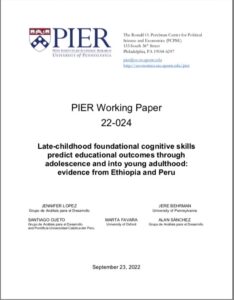Late-childhood foundational cognitive skills predict educational outcomes through adolescence and into young adulthood: evidence from Ethiopia and Peru
| Year | : | 2022 |
|---|---|---|
| Author/s | : | Jennifer López, Jere R. Behrman, Santiago Cueto, Marta Favara, Alan Sanchez |
| Area/s | : |
López, J., Behrman, J.R., Cueto, S., Favara, M. & Sanchez, A. (2022). Late-childhood foundational cognitive skills predict educational outcomes through adolescence and into young adulthood: evidence from Ethiopia and Peru [PIER Working Paper, 22-024].
The authors estimate the associations between a set of foundational cognitive skills (inhibitory control, working memory, long-term memory, and implicit learning) measured at age 12 and educational outcomes measured at ages 15 and 19-20 in Ethiopia and Peru (the Young Lives study). The estimates adjust for a rich set of lagged controls and include measurements of children’s general abilities. For a subset of the outcomes, they exploit within-household variation. Working memory and long-term memory are consistently and positively associated with subsequent domain- specific cognitive achievement tests in both countries, university enrolment in Peru (working memory) and lower secondary-school completion in Ethiopia (long-term memory). Inhibitory control predicts subsequent math-test scores in both countries, and grade attainment in Ethiopia. These results provide additional evidence to justify the importance of promoting investments in cognitive skills throughout childhood and adolescence, and these results potentially elucidate how investments in children impact their educational achievements.






